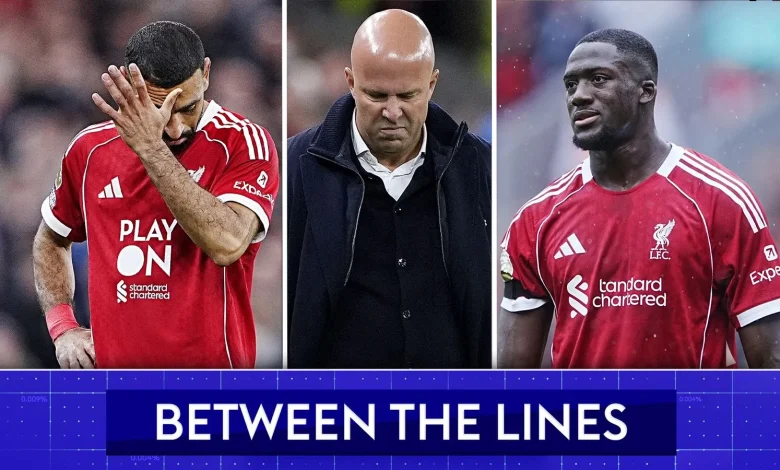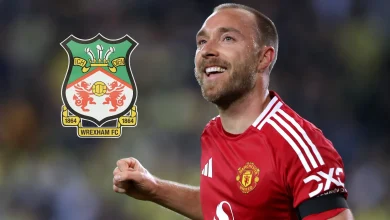Liverpool’s defeat to Man City raised questions of their physicality and intensity – Between the Lines

Liverpool’s 3-0 loss to Manchester City left them eight points behind Premier League leaders Arsenal in eighth. Arne Slot’s side were outplayed at the Etihad Stadium. They were also overpowered. Have they lost their physical edge?
The Sky Sports punditry team highlighted their physical issues after the game. “City looked stronger, technically better and much better physically than Liverpool,” said Roy Keane. “I thought Liverpool looked like a really weak team today.”
Gary Neville gave a similarly damning verdict, even before Manchester City’s second and third goals. “Liverpool look leggy,” he said on co-commentary. “Physically, they look well off it.”
Jamie Carragher, meanwhile, highlighted the lack of intensity in their efforts to stop City from playing through them in the lead-up to the first goal. “It’s really poor from Liverpool,” he said. “They should be able to get a challenge in and get a touch on the ball.”
Roy Keane felt Liverpool’s defeat to Man City pushed them into crisis
Liverpool did come into the game on the back of an intense Champions League meeting with Real Madrid on Tuesday night. But they had an extra day’s recovery time compared to Manchester City, who played Borussia Dortmund on Wednesday.
So, should Liverpool fans be worried about the side’s physicality?
Has an area of strength become a weakness?
Intensity on the wane?
Both managers were asked about the two sides’ contrasting fortunes in the duels after Sunday’s game. The numbers showed a significant gulf between their success rates.
In fact, at just 38.8 per cent, Liverpool’s duel success rate was the third-lowest by a Premier League team in any game this season.
Liverpool are not the first side to struggle in the duels against Manchester City. They have the highest duel success rate in the Premier League this season. Pep Guardiola pointed out the importance of their ability to win duels by retaining possession under pressure as well as through challenges after Sunday’s game.
But a lack of off-the-ball intensity has been a consistent issue for Liverpool this season. Their physicality, a huge part of their identity under Slot’s predecessor Jurgen Klopp, appears to be waning, with their numbers trending downwards in several areas.
Liverpool are making fewer tackles and interceptions combined than in any of the last seven Premier League seasons.
That passiveness could be seen at the Etihad Stadium. Manchester City made 17 tackles to Liverpool’s eight, despite the two sides having roughly even shares of possession.
Tracking data also showed Guardiola’s side collectively ran a whopping nine kilometres further than Slot’s.
While Manchester City rank top for distance covered per 90 minutes among Premier League clubs this season, factoring stoppage-time played, Liverpool rank third from bottom.
Title rivals Manchester City and Arsenal have increased the amount of ground they are covering in games this season but Liverpool’s numbers have declined – and not for the first time in recent years.
The reduction in Liverpool’s distance covered under Slot is partly by design. The former Feyenoord boss implemented a more controlled approach than his predecessor last term, helping Liverpool conserve energy on their way to winning the title.
At the same time, though, they continued to press effectively.
The same can’t be said of their efforts this season.
Pressing problems
Liverpool’s numbers for pressures have dropped significantly.
They are also registering fewer counter-pressures, which are defined as pressures made within two seconds of a turnover.
Klopp once described good counter-pressing as “better than any playmaker” as a means of creating chances. It became a huge feature of Liverpool’s play. But, again, there has been a notable drop-off this season. Liverpool are lacking their characteristic bite.
This can partly be attributed to Premier League-wide trends as more teams go direct with long passes to bypass pressing structures, something Slot himself has referenced. But Liverpool’s counter-pressing has dropped faster than the league average.
A lack of cohesion is undoubtedly another factor.
Gary Neville believes Florian Wirtz’s performances have become a problem for Liverpool
Effective pressing is a collective effort which demands synchrony and mutual understanding. Liverpool are having to build that chemistry again following extensive changes to personnel.
Hugo Ekitike, Alexander Isak and, in particular, Florian Wirtz, are all capable when it comes to pressing but they do not have the built-up tactical understanding of the players they have replaced.
They are not the only ones struggling to meet previous standards, either. All six of the midfielders and forwards who were part of Liverpool’s title-winning campaign last term are registering fewer pressures and counter-pressures than last season.
Dominik Szoboszlai’s numbers have likely been impacted by filling in at right-back in some games but the pattern can be seen across the board. Manchester City’s first goal on Sunday, when they played their way out from next to the corner flag, was the latest example of the waning effectiveness of Liverpool’s press.
Liverpool did have some joy in their 2-0 win over Aston Villa, with both goals coming after turnovers, but Carragher pointed out Villa’s culpability on Monday Night Football. “I actually think it was Aston Villa’s mistakes with the ball rather than Liverpool’s press,” he said.
Jamie Carragher analysed Liverpool’s pressing issues ahead of their games against Real Madrid and Man City in last week’s Monday Night Football
Carragher implored Slot to be braver with Liverpool’s press. “They haven’t gone man-to-man enough,” he said, referencing Slot’s preference for keeping an extra man in his backline.
Maybe, then, a tactical adjustment to the way Liverpool are pressing could help them become more effective out of possession. But it is a question of physicality too. Clearly, Liverpool have work to do to reverse recent trends and regain their physical edge.
Read the last Between the Lines
Does English football have a manager sacking problem? Last week’s instalment of Between the Lines explained the extent of the issue up and down the pyramid and revealed some alarming numbers.





